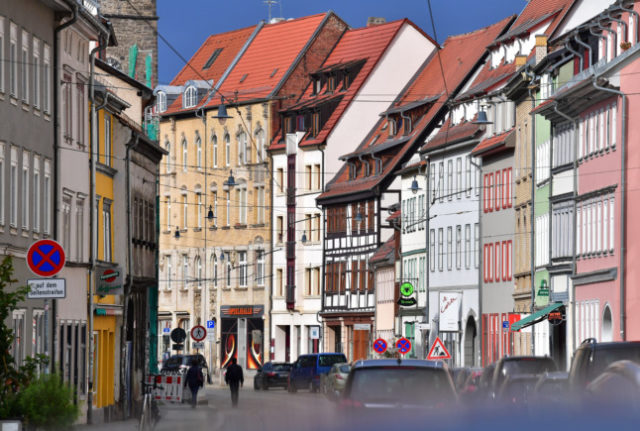According to data from the Robert Koch Institute (RKI), the 7-day incidence in the central-eastern state of Thuringia was 103 last Wednesday, October 13th.
But within a week, this figure had risen to 163 – giving the eastern state by far the highest incidence in the country. The latest figures show a remarkable turnaround from just a matter of weeks ago, when western states like North Rhine-Westphalia and Baden-Württemberg had incidences nearing 100, while many eastern states remained below the 30 mark.
Since then, the 7-day incidence of Covid infections has been dropping across western Germany, while the eastern states of Thuringia and Saxony have seen their own infection rates rise dramatically.
In addition, the weekly incidence of people admitted to hospital with Covid is around double the national figure. On Wednesday, the RKI reported that the 7-day incidence of Covid hospitalisations – the most important figure for deciding new government measures – stood at 2.34 nationwide. In Thuringia, the value is 5.52.
READ ALSO: Germany sees steep rise in Covid cases
Why is this happening?
The Thuringian Ministry of Health believes that several factors are playing a role in the sharp increase in infections.
“It is almost certainly also due to the low vaccination rates,” a spokesperson told DPA on Wednesday.
Although vaccinated people can also become infected and pass on the virus, they are much less infectious than unvaccinated people, and, when infected, much more likely to end up hospital.
With just 61 percent of its population fully vaccinated, Thuringia has the second-lowest vaccination rate in Germany. The least vaccinated state in the country is Saxony, where the 7-day incidence is just over 116 per 100,00 people.
Meanwhile, front-runner Bremen has inoculated more than 77 percent of its population, and the 7-day incidence of infections per 100,000 people has recently dropped to 70 .
Equally, in Thuringia, children haven’t broken up for the autumn break yet, meaning outbreaks in schools are still having a strong impact on the Covid figures.
This situation has recently come to a head in Jena after the city’s mayor, Thomas Nitzsche (FDP), revealed that the authorities were currently unable contain the number of infections in schools.

Students in masks sit in a repurposed sports hall for classes in a school in Jena to allow for social distancing. Photo: picture alliance/dpa/dpa-Zentralbild | Bodo Schackow
Though recent statistics show higher-than-average incidences among school children and teenagers, the state government in Thuringia has so far taken the view that schools are not significant drivers of infection.
“That is, of course, highly dangerous,” said Nitzsche. “We see it differently.”
According to the Thuringian Ministry of Health, however, the high incidence in the state is not directly related to infection incidence in younger age groups alone.
Will the trend continue?
Experts assume that autumn holidays could have a temporary dampening effect on Covid infections in Thuringia, since school children will no longer be socialising with each other indoors.
However, virologists have been predicting an increase in infections at this time of year for months – especially in light of slow progress in the national vaccination campaign.
In fact, top virologist Christian Drosten warned in late September that infections were picking up pace in the eastern states. If the same thing happens elsewhere, Germany could be in for a tough autumn and winter, he said.
“Around three million people over 60 in Germany have not yet been vaccinated against Sars-CoV-2,” Uwe Janssens, former president of the intensive care association DIVI, told DPA on Tuesday.
Experts say a small percentage of so-called ‘breakthrough’ infections are also to be expected, even if people are vaccinated.
READ ALSO: Covid resurgence likely to hit Germany in October, warns top virologist



 Please whitelist us to continue reading.
Please whitelist us to continue reading.
“Although vaccinated people can also become infected and pass on the virus, they are much less infectious than unvaccinated people, and, when infected, much more likely to end up hospital.”
This reads a little strange – I take it you mean that UNvaccinated people are much more likely to end up in Hospital?